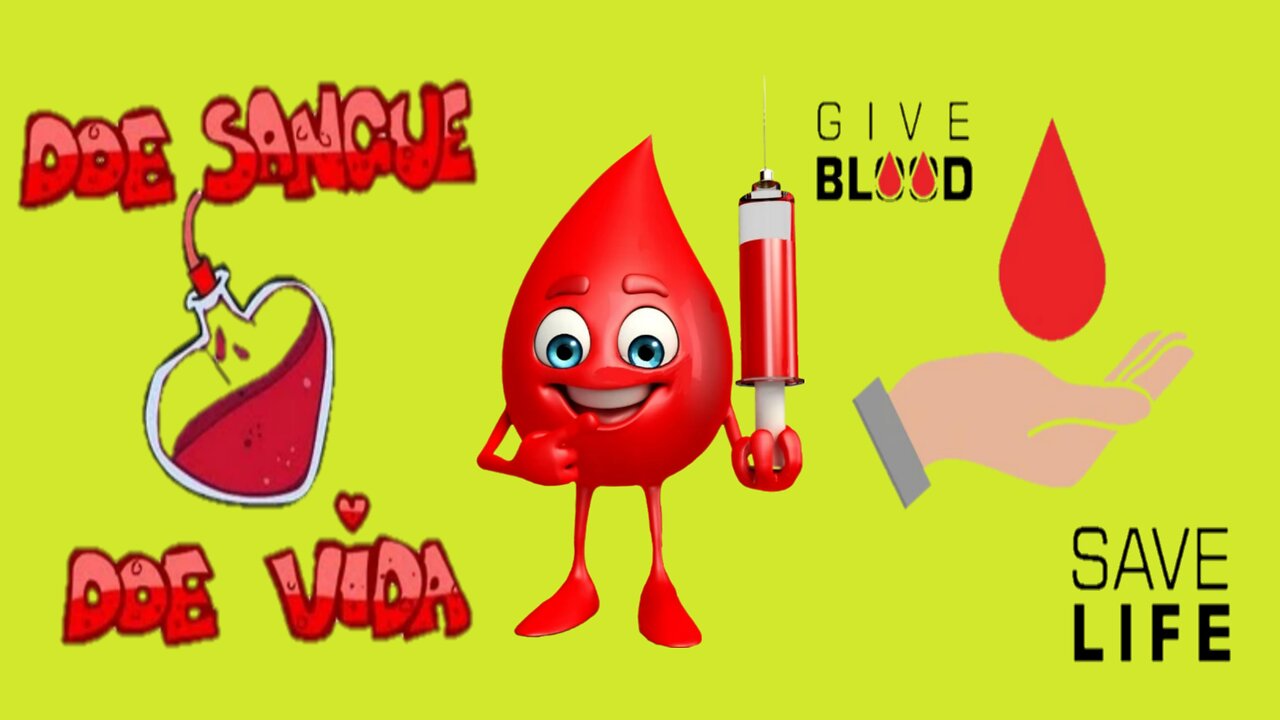Premium Only Content

give blood save life Importance of Blood Donation:
Importance of Blood Donation:
Emergency Situations: Blood is often needed in emergency situations, such as accidents, surgeries, or natural disasters.
Medical Conditions: Individuals with certain medical conditions, like cancer or blood disorders, may require regular blood transfusions.
Types of Blood Donation:
Whole Blood Donation: The most common type, where a person donates a unit of whole blood.
Plasma Donation: Involves donating only the plasma component of blood, which is rich in proteins.
Platelet Donation: Platelets are tiny cells that help blood to clot. Platelet donation is often used for cancer patients and those with clotting disorders.
Blood Types:
Blood is categorized into different types based on the presence or absence of certain antigens and antibodies. The most common blood types are A, B, AB, and O, and they can be either Rh-positive or Rh-negative.
Donor Eligibility:
Donors must meet certain eligibility criteria, including age, weight, and overall health.
A screening process is conducted to ensure the safety of both the donor and the recipient.
Frequency of Donation:
The frequency of blood donation depends on the type of donation and local regulations.
Whole blood donation is typically allowed every 8 to 12 weeks.
Blood Donation Process:
The donation process is relatively simple and usually takes about 10-15 minutes for whole blood donation.
After donation, individuals are provided with refreshments and rest to ensure they recover fully.
Voluntary and Non-Remunerative:
Blood donation is voluntary, and donors do not receive any monetary compensation for their donation. This ensures the act is driven by altruism and a desire to help others.
Community Blood Drives and Donation Centers:
Blood can be donated at designated blood donation centers or during community blood drives organized by hospitals, blood banks, or other organizations.
Health Benefits for Donors:
Regular blood donation has potential health benefits for donors, including reducing the risk of certain diseases and improving cardiovascular health.
Global and National Initiatives:
Various national and international organizations promote and coordinate blood donation efforts to ensure an adequate and safe blood supply.
If you are interested in donating blood, it is advisable to contact your local blood bank or donation center to get information on eligibility criteria and donation procedures. Donating blood is a noble and lifesaving act that contributes significantly to public health and healthcare systems.
-
 3:56:39
3:56:39
Alex Zedra
5 hours agoLIVE! New Game | The Escape: Together
40.4K6 -
 LIVE
LIVE
FreshandFit
6 hours agoJoe Budden Arrested For Being A Perv! Tesla Cybertruck Explosion
5,909 watching -
 2:08:45
2:08:45
Kim Iversen
9 hours agoNew Year, New PSYOP?: The Fort Bragg Connection In The New Years Terror Attacks
61.9K112 -
 1:41:18
1:41:18
Glenn Greenwald
8 hours agoTerror Attacks Exploited To Push Unrelated Narratives; Facing Imminent Firing Squad, Liz Cheney Awarded Presidential Medal | SYSTEM UPDATE #381
90.2K165 -
 1:00:32
1:00:32
Man in America
10 hours ago🔴 LIVE: Terror Attacks or False Flags? IT DOESN'T ADD UP!!!
47.6K15 -
 1:02:38
1:02:38
Donald Trump Jr.
12 hours agoNew Year’s Terror, Latest Breaking News with Sebastian Gorka | TRIGGERED Ep.204
186K372 -
 59:59
59:59
The StoneZONE with Roger Stone
7 hours agoAfter Years of Targeting Trump, FBI and DOJ are Unprepared to Stop Terror Attacks | The StoneZONE
55.2K16 -
 1:26:42
1:26:42
Leonardaisfunny
5 hours ago $3.85 earnedH-1b Visas: Infinity Indians
35.1K18 -
 1:08:33
1:08:33
Josh Pate's College Football Show
10 hours ago $2.41 earnedPlayoff Reaction Special: Ohio State Owns Oregon | Texas Survives | UGA vs Notre Dame Takeaways
33.9K6 -
 58:04
58:04
Kimberly Guilfoyle
10 hours agoFBI's Terror Response Failures, Live with Steve Friend & Kyle Seraphin | Ep. 185
107K43